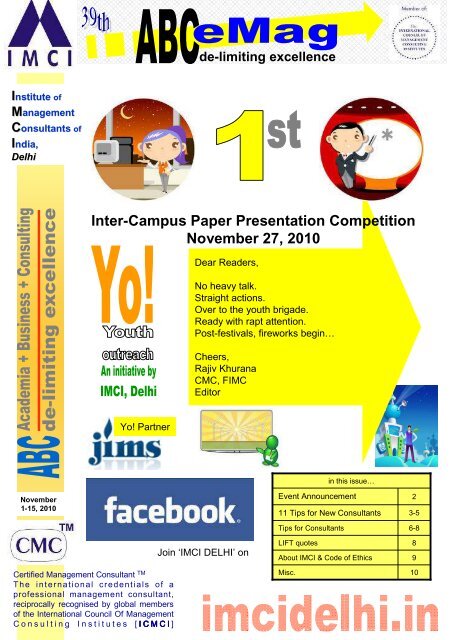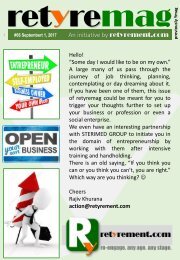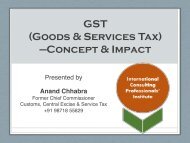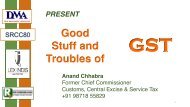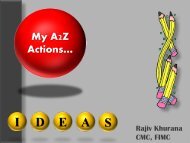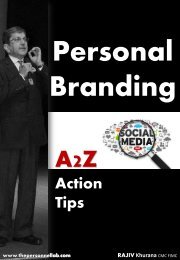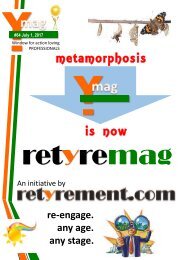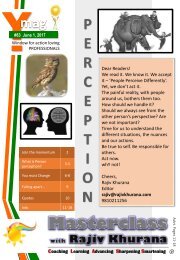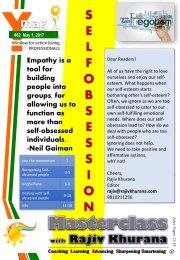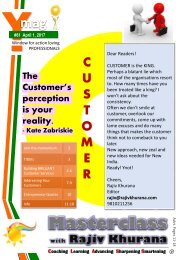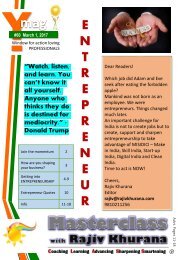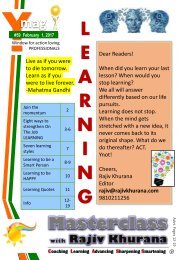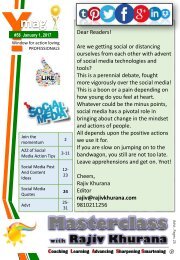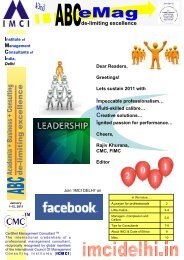IMCI-Delhi-39th-ABCeMag-151110.161211442
You also want an ePaper? Increase the reach of your titles
YUMPU automatically turns print PDFs into web optimized ePapers that Google loves.
de-limiting excellence<br />
Institute<br />
of<br />
Management<br />
Consultants<br />
of<br />
India,<br />
<strong>Delhi</strong><br />
Inter-Campus Paper Presentation Competition<br />
November 27, 2010<br />
Dear Readers,<br />
No heavy talk.<br />
Straight actions.<br />
Over to the youth brigade.<br />
Ready with rapt attention.<br />
Post-festivals, fireworks begin…<br />
Cheers,<br />
Rajiv Khurana<br />
CMC, FIMC<br />
Editor<br />
Yo! Partner<br />
in this issue…<br />
November<br />
1-15, 2010<br />
Event Announcement<br />
11 Tips for New Consultants<br />
Tips for Consultants<br />
2<br />
3-5<br />
6-8<br />
Certified Management Consultant TM<br />
T h e i n t ernational credentials of a<br />
professional management consultant,<br />
reciprocally recognised by global members<br />
of the International Council Of Management<br />
C o n s u l t i n g I n s t i t u t e s [ I C M C I ]<br />
Join ‘<strong>IMCI</strong> DELHI’ on<br />
LIFT quotes<br />
About <strong>IMCI</strong> & Code of Ethics<br />
Misc.<br />
8<br />
9<br />
10
de-limiting excellence<br />
Institute<br />
of<br />
Management<br />
Consultants<br />
of<br />
India,<br />
<strong>Delhi</strong><br />
November<br />
1-15, 2010<br />
2/10<br />
On November 27, 2010, teams from<br />
various management schools of NCR<br />
will compete to present their ideas<br />
through a 12 minutes PowerPoint<br />
projection and face a short volley of<br />
questions from judges.<br />
The theme:<br />
CWG2010: Lessons<br />
for Corporate<br />
Managers<br />
The team must consist of three<br />
management students duly sponsored<br />
by their Institute.<br />
Some of the key aspects that may be<br />
considered for inclusion are:<br />
Leadership, Corporate Governance,<br />
Project Management, Planning and<br />
Execution, Financial Discipline, People<br />
Engagement, Culture Building, ROI<br />
from Stakeholders perspective, Brand<br />
Management, Media Relations etc.<br />
What do the IDEA BALL game players<br />
get?<br />
•Marksmanship exposure before the<br />
Corporate Elite.<br />
•Experts’ inputs on Ideas and<br />
Presentations<br />
•Certificates for all<br />
•Trophies for the winning team<br />
We have set the ball rolling. Come and<br />
play your ideas.<br />
Write to imcidelhi@gmail.com for<br />
participation.<br />
Nov. 27<br />
10 am onwards<br />
JIMS, Kalkaji,<br />
New <strong>Delhi</strong><br />
Yo! event partner<br />
Alag Tewar,<br />
Alag Flavour<br />
[This concept is the intellectual property of <strong>IMCI</strong> <strong>Delhi</strong>]
de-limiting excellence<br />
Institute<br />
of<br />
Management<br />
Consultants<br />
of<br />
India,<br />
<strong>Delhi</strong><br />
November<br />
1-15, 2010<br />
3/10<br />
Alag Tewar,<br />
Alag Flavour<br />
1. Set up Google Alerts for your client and its competitors<br />
This is an absolute must. Google Alerts feed you the latest online<br />
information (collected primarily from news sites and blogs) related to<br />
keywords that you specify.<br />
Setup these alerts for your client and its top 3 competitors.<br />
This will help you stay current on client and industry developments, which<br />
will come in handy through the project. Many people are too pre-occupied<br />
to do this regularly, and it’s a quick win for new consultants to add value.<br />
2. Know basic financial data for your client<br />
I can’t tell you the number of times basic questions like “What’s Client X’s<br />
total annual revenue?” have come up in internal discussions.<br />
You want to be the one that can provide an accurate answer, as opposed<br />
to “Oh, I think it’s something like $10-20 billion…let me check.”<br />
Some key numbers include:<br />
-Market cap<br />
-Overall revenue<br />
-Gross profit<br />
-Margins (profit and operating)<br />
Memorizing them doesn’t take long. It will come in handy.<br />
3. Familiarize yourself with the client CEO and senior management<br />
There are many stories of newbie consultants having a casual<br />
conversation with an employee in the company cafeteria, only to realize a<br />
week later that it was an Executive VP. Don’t let this happen to you. You<br />
can find most executive profiles on the client website. Read them<br />
thoroughly and become familiar with the faces. Not only will it prevent<br />
foul-ups like the above, it will also help you understand and manage<br />
client relationships.<br />
4. Familiarize yourself with the competitors<br />
This shouldn’t take more than a few hours. Simply have a grasp on the<br />
following:<br />
-Who are the top 5-10 competitors<br />
-Relative sizes (eg, number of employees, overall revenues)<br />
-Key products/services (especially what differentiates each competitor<br />
from the client)<br />
-General grasp of their strengths and weaknesses<br />
Good ways to get a quick handle on this include:<br />
-Internal firm research reports (if available)<br />
-Analyst reports (eg, JP Morgan, Credit Suisse, etc)<br />
Periodically review this information to make sure you’re fresh. While it’s<br />
important to know this info, it’s even more important that you don’t<br />
confuse one competitor with another.<br />
Don’t ignore the small, innovative guys. The best way to identify them is<br />
to scour Google and Techcrunch for your client’s name and industryrelated<br />
keywords. Staying current on innovative practices is one way to<br />
be a thought leader
de-limiting excellence<br />
Institute<br />
of<br />
Management<br />
Consultants<br />
of<br />
India,<br />
<strong>Delhi</strong><br />
November<br />
1-15, 2010<br />
4/10<br />
Alag Tewar,<br />
Alag Flavour<br />
5. Store the contact information for all people on your team,<br />
especially partners<br />
Available through your firm intranet/database. Program the<br />
following into your Blackberry for all involved parties, from<br />
interns to senior partners:<br />
-Cellphone number<br />
-Office number (if available)<br />
-Email address<br />
-Secretary email and direct line (if applicable)<br />
Some of you may think this is overdoing it. But on every 2-month<br />
project, there will be at least 2 times where a client meeting is<br />
about to start, the partner can’t be found, and no one has<br />
immediate laptop access. This is when having all those numbers<br />
programmed into your phone comes in very handy.<br />
It’s especially likely when you have multiple partners, visiting<br />
“experts”, and rotating teams.<br />
6. Thoroughly review previous client-related work<br />
Most consulting firms have internal “knowledge libraries” that<br />
store information about past projects and the firm’s latest<br />
thinking.<br />
When you’re starting a project, you should mine that library for<br />
information related to your client, its competitors, and even<br />
functionally similar projects (eg, if this is your first cost-reduction<br />
case, you’ll find plenty of introductory material on running a<br />
cost-reduction project including examples of analyses, suggest<br />
output, etc).<br />
Pay very close attention to the work that’s been done before –<br />
this will help your team avoid re-creating the wheel (which can<br />
happen surprisingly often).<br />
You should also review the “sales documents” that led to the<br />
project, including the project proposal and preliminary research<br />
7. Know a few good places for team events and dinners<br />
As the newbie consultant, the responsibility of planning team<br />
events(such as dinners, team-bonding activities, etc) will fall on<br />
you.<br />
Take the opportunity to demonstrate your diligence and attention<br />
to detail. It helps if you have an idea – particularly in unfamiliar<br />
cities – of the fun/popular things to do. Ask your friends and do<br />
internet research. The more familiar you are, the better prepared<br />
you’ll be.<br />
While a poorly planned team dinner at the city steakhouse won’t<br />
kill your performance review, people will notice. It’s not your fault<br />
that the food wasn’t amazing, but it is your fault that the taxis<br />
arrived late, you didn’t invite the partners, and forgot to make the<br />
reservation.
de-limiting excellence<br />
Institute<br />
of<br />
Management<br />
Consultants<br />
of<br />
India,<br />
<strong>Delhi</strong><br />
November<br />
1-15, 2010<br />
5/10<br />
Alag Tewar,<br />
Alag Flavour<br />
8. Build a knowledge hub of client/project-related<br />
documents<br />
Sometimes this will already be started by your<br />
manager/teammates. If not, take the lead and create a shared<br />
hub for project-related documents. Things to put in it:<br />
-Annual reports<br />
-Analyst reports for client and competitors<br />
-Documents and presentations from previous client-related work<br />
-Primers on the industry and function<br />
This will be an invaluable resource. Organize it<br />
well. Continually update as the project progresses with new<br />
reports, presentations, and so forth.<br />
9. Pack extra supplies<br />
The Scout Motto is “Be Prepared”. If the previous 8 tips haven’t<br />
taught you the value of contingency planning, this one should<br />
put you over the top.<br />
Be reasonable – no one’s asking you to bring 4 laptops. But<br />
have backups of small, necessary equipment that less prepared<br />
team mates may forget.<br />
Examples include: power cords, ethernet cables, USB drives,<br />
mouse<br />
It’s not fun stepping into your new team room on a Monday<br />
morning, and realizing that you have no power cord.<br />
10. Proofread all client-ready documents<br />
Do this even if you’re not asked. The day/night before a client<br />
meeting, review the final version of the documents carefully.<br />
You’re looking for small mistakes like misspellings, syntax<br />
errors, and misaligned charts. Do a quick sanity check on the<br />
analyses.<br />
Partners and clients can become unreasonably focused on<br />
typos and other nits. You want the discussion to be about the<br />
synthesis, not the syntax.<br />
11. Build a strong working relationship with the team<br />
assistant<br />
At the beginning of each engagement, introduce yourself to the<br />
team assistant. This person is absolutely critical to a highperforming<br />
team.<br />
Not only do they coordinate the frenetic schedules of all parties<br />
involved, they often help on things like proofreading and basic<br />
research.<br />
As the new consultant on the team, you may interface with them<br />
frequently. Earning their respect is important to getting things<br />
done promptly. After all, team assistants have busy calendars<br />
too. You want your requests to have top-priority.<br />
Source: http://managementconsulted.com
de-limiting excellence<br />
Institute<br />
of<br />
Management<br />
Consultants<br />
of<br />
India,<br />
<strong>Delhi</strong><br />
I spend a fair amount of time online, with<br />
a lot of time attending to social media,<br />
email, web-based or database research<br />
and quantitative analysis. Most of this is<br />
presumably productive, but what is a<br />
"right amount?"<br />
There is no "right" amount because each of<br />
these activities may be highly productive for<br />
your particular consulting practice. It is easy<br />
to feel like any one of these is "too much"<br />
because, compared to the past, you are<br />
spending much more time on that activity.<br />
How much time did you spend 15 years ago<br />
on email? Is what you spend now too much<br />
or too little? New web applications, new<br />
distractions, and new resources can skew<br />
our appreciation for what is really most<br />
useful.<br />
Consider RescueTime, an application that<br />
intelligently tracks what applications you<br />
spend your time with, including where you<br />
spend most of your time surfing. It has a<br />
really clever feature, called Focus Time," in<br />
which you set a time during which it will warn<br />
you if you stray off your chosen task (to, say,<br />
respond to that "urgent" instant message, or<br />
"quickly" look up something on a website -<br />
that lasts 15 minutes).<br />
November<br />
1-15, 2010<br />
Tip: Before tracking your time, estimate how<br />
much time you spend throughout the day on<br />
various activities and adjust to what you think<br />
is an appropriate proportion for each. Once<br />
you get your usage data, you can see what,<br />
based on your own criteria, is too much (or<br />
too little) time spent in a given activity.<br />
6/10<br />
Alag Tewar,<br />
Alag Flavour
de-limiting excellence<br />
Institute<br />
of<br />
Management<br />
Consultants<br />
of<br />
India,<br />
<strong>Delhi</strong><br />
November<br />
1-15, 2010<br />
7/10<br />
I get it that people receive a lot of emails and can't<br />
always answer them right away, but what's the<br />
difference between an email that gets opened right<br />
away and one that is saved for later attention?<br />
Assuming the recipient is in an email reading mood, there<br />
are probably three things that most determine what gets<br />
opened right away:<br />
The return address. Let's face it, we are more likely to act<br />
on emails from family and friends than ones from a<br />
complete stranger. Furthermore, the "display as" text in the<br />
return address (over which you have some control) can<br />
send your email to the junk folder (by an automated<br />
process) or the deleted folder (by the recipient). If your<br />
"Display As" return address text includes provocative<br />
words (e.g., "sales," "offer," or "free"), you might consider<br />
whether this is the reason your emails are not being<br />
opened.<br />
The subject line. Usually the second thing a recipient<br />
looks for, but sometimes the first. Make it crystal clear what<br />
you want from the reader. Also, consider writing the subject<br />
line first, before the body of the email, when you are not<br />
deep into the details of your offer or request. Ask yourself<br />
what you want the reader to think, feel or do after reading<br />
and put that in less than 50 characters. If you limit yourself<br />
to this length, this can make your emails themselves<br />
crisper (less time to write and less time to read - everyone<br />
wins).<br />
Get to the point - quickly. Many people use email<br />
readers that have a reading pane that show a few lines of<br />
body text. If the reason why I should be interested is not<br />
clear, and I have other things on my mind, your email is<br />
going into the "later" pile, which may mean the "never" pile.<br />
Tip: If you have gotten this far, don't blow it by making the<br />
reader think they didn't receive your full attention when you<br />
wrote it. Impersonal and oddly formatted emails send<br />
subtle clues that the reader's time was not being<br />
respected. Finally, if the body is too long, you risk a "later"<br />
decision that may never be fulfilled. It is often better to use<br />
a short email and attach the longer content, which<br />
increases the chances that your core message will be<br />
received.<br />
Alag Tewar,<br />
Alag Flavour
de-limiting excellence<br />
Institute<br />
of<br />
Management<br />
Consultants<br />
of<br />
India,<br />
<strong>Delhi</strong><br />
“Today is your day!<br />
Your mountain is<br />
waiting. So... get on<br />
your way.”<br />
- Theodor Seuss<br />
Geisel (Dr. Seuss)<br />
I've heard the phrase, "Don't boil<br />
the ocean!" from time to time, but<br />
I am not clear on its meaning.<br />
November<br />
1-15, 2010<br />
Leaders establish<br />
the vision for the<br />
future and set the<br />
strategy for getting<br />
there; they cause<br />
change. They<br />
motivate and inspire<br />
others to go in the<br />
right direction and<br />
they, along with<br />
everyone else,<br />
sacrifice to get<br />
there.<br />
- John Kotter<br />
“Reason and judgment<br />
are the qualities of a<br />
leader.”<br />
- Tacitus<br />
The phrase "boil the ocean" refers to<br />
the act of "over-scoping" a project,<br />
trying to solve too large a problem,<br />
or too many problems at once),<br />
thereby making your success at<br />
effectively solving it unlikely. It can<br />
describe an attempt at achieving<br />
something that is too large in scale<br />
or way too ambitious. Finally, it often<br />
means making an effort that, even if<br />
successful, would have marginal<br />
value to a client. Attempting to "boil"<br />
the ocean is not a practical task to<br />
take on due to its sheer magnitude<br />
(and, given the Earth's oceans<br />
contain about 1.4 billion cubic<br />
kilometers, that's a lot to boil!)<br />
Tip: Consultants can run the risk of<br />
attempting to "boil the ocean" when<br />
scoping their projects and must work<br />
with their clients to set realistic<br />
expectations and successful and<br />
timely delivery of results.<br />
8/10<br />
Leadership Ideas For Today<br />
Alag Tewar,<br />
Alag Flavour<br />
Extracts from the gift book- LIFT,<br />
pending print, by<br />
- Rajiv Khurana, CMC, FIMC
de-limiting excellence<br />
Institute<br />
of<br />
Management<br />
Consultants<br />
of<br />
India,<br />
<strong>Delhi</strong><br />
November<br />
1-15, 2010<br />
9/10<br />
Alag Tewar,<br />
Alag Flavour<br />
ICMCI<br />
The International Council of<br />
Management Consulting Institutes<br />
is the global association of national<br />
management consulting institutes<br />
from around the world. These<br />
national institutes administer, in<br />
accordance with world class<br />
standards, the international "CMC"<br />
certification Certified Management<br />
Consultant earned by individual<br />
professional management<br />
consultants.<br />
More details: icmci.org<br />
<strong>IMCI</strong><br />
The Institute of Management Consultants<br />
of India (<strong>IMCI</strong>) is the apex body of<br />
management consulting professionals,<br />
being the only registered institute of<br />
established management consultancy<br />
firms and practicing individuals in the<br />
country.<br />
Constituted in 1991, <strong>IMCI</strong> was formerly<br />
known as the Management Consultants’<br />
Association of India (MCAI), which was<br />
founded in 1963.<br />
In 1989, <strong>IMCI</strong> became the first Asian<br />
organisation to be accepted for<br />
membership of the International Council<br />
of Management Consulting Institutes<br />
(ICMCI), the global apex body of<br />
Management Consulting Institutes. ICMCI<br />
has 46 member countries in the world.<br />
The Executive Secretariat of <strong>IMCI</strong> is<br />
located in Mumbai. The Institute has<br />
regional Chapters in Ahmedabad,<br />
Bangalore, Calcutta, Chennai (Madras),<br />
<strong>Delhi</strong>, Hyderabad, Mumbai (Bombay) and<br />
Pune.<br />
CMC Designation<br />
<strong>IMCI</strong> endeavors to raise the standards of<br />
management consulting by awarding<br />
Certified Management Consultant (CMC)<br />
designation to individual members who<br />
have passed a qualifying examination<br />
and have met the profession’s standards<br />
of competence and ethics. The CMC<br />
designation implies international<br />
recognition to worldwide standards.<br />
More details: imcindia.co.in<br />
Code of<br />
Professional<br />
Conduct for<br />
<strong>IMCI</strong> members<br />
Minimum Guidelines<br />
Confidentiality<br />
A member will treat client information as<br />
confidential and will not take personal advantage<br />
of privileged information gathered during an<br />
assignment, or enable others to do so.<br />
Unrealistic Expectations<br />
A member will refrain from encouraging unrealistic<br />
expectations or promising clients that benefits are<br />
certain from specific consulting services.<br />
Commissions / Financial Interests<br />
A member will neither accept commissions,<br />
remuneration or other benefits from a third party<br />
in connection with recommendations to a client<br />
without the client’s knowledge and consent, nor<br />
fail to disclose any financial interest in goods or<br />
services which form part of such<br />
recommendations.<br />
Assignments<br />
A member will only accept assignments for which<br />
the member has the skill and knowledge to<br />
perform.<br />
Conflicting Assignments<br />
A member will avoid acting simultaneously (in<br />
potentially conflicting situations) without<br />
informing all parties in advance that this is<br />
intended.<br />
Conferring with Clients<br />
A member will ensure that before accepting any<br />
engagement, a mutual understanding of the<br />
objectives, scope, work plan and fee arrangements<br />
is established and any personal, financial or other<br />
interests which might influence the conduct of the<br />
work are disclosed.<br />
Recruiting<br />
A member will refrain from inviting an employee of<br />
a client to consider alternate employment without<br />
prior discussion with the client.<br />
Approach<br />
A member will maintain a fully professional<br />
approach in all dealings with clients, the general<br />
public and fellow members.<br />
Code of Professional Conduct<br />
A member will ensure that other management<br />
consultants carrying out work on the member’s<br />
behalf are conversant with and abide by the Code<br />
of Professional Conduct.
de-limiting excellence<br />
Institute<br />
of<br />
Management<br />
Consultants<br />
of<br />
India,<br />
<strong>Delhi</strong><br />
Visit<br />
Join group<br />
‘<strong>IMCI</strong> – <strong>Delhi</strong>’<br />
on linkedin.com<br />
http://twitter.com/imcidelhi<br />
Imagine<br />
The Client says “Take me as<br />
your apprentice. I will learn<br />
from you and come back.”<br />
What does it take?<br />
We await your<br />
ideas,<br />
suggestions,<br />
contribution,<br />
support …<br />
November<br />
1-15, 2010<br />
10/10<br />
Alag Tewar,<br />
Alag Flavour<br />
Patron:<br />
Dr. M.B.Athreya<br />
Mentors:<br />
Dr. S.R.Mohnot<br />
Mr. Shashi Budhiraja<br />
Dr. Sunil Abrol<br />
Past Chairmen:<br />
Mr. Ashok Kumar<br />
Mr. Ramesh Tyagi<br />
Chairman<br />
Rajiv Khurana<br />
Dy. Chairman<br />
Sumit Chaudhuri<br />
Hon. Secretary<br />
Vijay Nagrani<br />
Hon. Treasurer<br />
M S Sridhar<br />
Executive Members<br />
S A Khader<br />
Anand Chhabra<br />
Regional Rep.<br />
S A Khader<br />
<strong>IMCI</strong> – <strong>Delhi</strong><br />
imcidelhi@gmail.com<br />
This eMag is meant for free electronic circulation amongst members & friends of <strong>IMCI</strong> - <strong>Delhi</strong>


